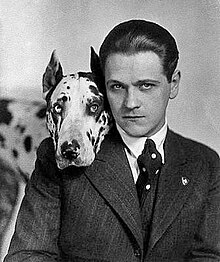Eugeniusz Bodo
Eugeniusz Bodo (actually Bohdan Eugène Junod ; born December 28, 1899 in Geneva , † October 7, 1943 in Kotlas , Soviet Union ) was one of the most popular Polish actors and film directors of the interwar period.
Life
He was the only son of the Swiss engineer Theodor Junod ( Calvinist ) and the Polish Anna Dylewska (Catholic), probably born in Geneva ( others claim in Warsaw ) and retained Swiss citizenship throughout his life . The family moved to Łódź in 1910 , where their father opened the "Urania" revue cinema . In 1917 Junod moved to Poznan and became a member of the Apollo Theater there. In 1919 he went to Warsaw with his new name (he formed it from the first two letters of his second name and those of his mother Dorota) to work at various musical theatersto play. He also played individual roles at the Teatr Polski there and at the Teatr Lutnia in Wilna .
With the emerging sound film, Bodo started a new career. In over 30 strips, v. a. Music films, he worked with until 1939. In the thirties he received various honors, including a. as the "King of Polish Actors". He also used his box office successes in the financial sector. In 1931 he co-founded the BWB film studio and two years later opened his own production company called Urania . In the spring of 1939, like his colleague Mieczysław Fogg , he opened his own café in Warsaw. After this was converted into a Wehrmacht café "only for Germans" under German occupation , he rented it out and fled to Soviet-occupied Lemberg , where a Polish cultural scene still existed. There he joined the renowned band Jazz Tea of the composer and bandleader Henryk Wars , who would later make a career in Hollywood. In June 1941 he was arrested by the NKVD and deported to the Gulag despite his Swiss passport . The passport also prevented it from falling under the amnesty for Polish citizens in the USSR as a result of the Sikorski-Majski Agreement . Via various prisons he was taken to a camp near the city of Kotlas , where he died in autumn 1943. This fact contradicted the version in the times of the People's Republic of Poland , where it was claimed that Bodo was shot by the Germans after their invasion of Lviv.
Movies
- Rywale (as Geniuś) 1925
- Czerwony błazen 1926
- Uśmiech losu (as a revue dancer) 1927
- Człowiek o błękitnej duszy (as a sculptor) 1929
- Policmajster Tagiejew (as Markowskij) 1929
- Kult ciała (as Franciszek, Czesław's helper) 1930
- Na Sybir (as a worker) 1930
- Niebezpieczny romans (as the head of a gang of burglars) 1930
- Uroda życia (1930) (as Roszow) 1930
- Wiatr od morza (as Otto) 1930
- Bezimienni bohaterowie (as police captain ) in 1932
- Głos pustyni (as Sheikh Abdullah) 1932
- Jego ekscelencja subiekt (as Jurek, leading role) 1933
- Zabawka (as Kuźma, son of a forest worker) 1933
- Czarna perła (as Stefan) 1934
- Czy Lucyna to dziewczyna? (as engineer Stefan Żarnowski) 1934
- Kocha, lubi, szanuje (as a pharmacy intern Władysław) 1934
- Pieśniarz Warszawy (as Julian) 1934
- Jaśnie pan szofer (as Boratyński) 1935
- Amerykańska awantura (as Paweł) 1936
- Książątko (as Tadeusz Rolski) 1937
- Piętro wyżej (as radio announcer Henryk Pączek) 1937
- Skłamałam (as Karol Borowicz) 1937
- Paweł i Gaweł (as Paweł) 1938
- Robert i Bertrand (as Bertrand) 1938
- Strachy (as Zygmunt Modecki) 1938
- Za winy niepopełnione (as Torrence, Holski's friend and partner) in 1938
Web links
- Eugeniusz Bodo in the Internet Movie Database (English)
- Jak umierał Eugeniusz Bodo , "Rzeczpospolita" from October 7, 2008.
- Bodo, dziecko XX wieku . Gazeta.pl. Retrieved September 29, 2013.
Individual evidence
- ↑ Eugeniusz Bodo - zaginiony na Wschodzie . Polskie radio . Retrieved September 29, 2013.
| personal data | |
|---|---|
| SURNAME | Bodo, Eugeniusz |
| ALTERNATIVE NAMES | Eugène Bohdan Junod |
| BRIEF DESCRIPTION | Polish-Swiss actor, film director and film producer |
| DATE OF BIRTH | December 28, 1899 |
| PLACE OF BIRTH | Geneva , Switzerland |
| DATE OF DEATH | October 7, 1943 |
| Place of death | Kotlas , Soviet Union |
